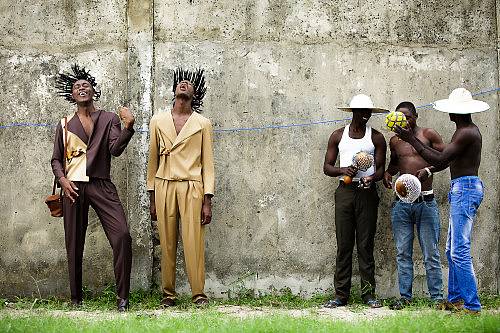Orange Culture, which Adebayo Oke-Lawal describes as a “movement” more than a clothing line, is for a creative class of men who he describes as “self aware , expressive, explorative, art-loving nomad[s].” The label previously produced womenswear options, but Oke-Lawal says he’s since decided to focus on the fellas. Combining classic and contemporary western silhouettes (like collared button-ups and lapel-less blazers) with African sensibilities, Oke-Lawal creates offerings for modern men who like a little flair, and of course: colour. Orange Culture is a heady mixture of Nigerian inspired silhouettes, print fabrics and contemporary urban street wear.

Tell us a little bit about yourself and what you do. My name is Adebayo Okelawal — Nigerian, 25 years old and spending everyday of my life building a brand that is the product of my mental state of mind. I love art music and cultural immersion — especially my culture. It is beautifully rich and highly diverse.
What are some recent, upcoming or current projects you are working on? Well we are currently working on AW16 and are set to show in Cape Town by the beginning of February during SA fashion week. I also just launched a mid range line called ‘Orange by Orange Culture’ and a street wear line called ‘OC by orange culture’.

How did your interest in art or fashion begin? I’ve loved fashion since I was a quiet little kid in primary school. I spent most of my classes sketching behind my notebooks and recreating sketches from Argos clothing magazines at home. I remember being about 10 and having a TV box filled with over a 100 cut-out sketches from all my school notebooks. I found happiness in designing even at that age — it gave me a voice. That’s when the love for fashion all began.
#1 fashion don’t? Durags – I really despise them.
If you had to explain your work or brand to a stranger, what would you say? We love to create emotional clothing — if you want to get to know me personally, get to know Orange Culture.

What materials do you use in your work and what is your process like? The process of deciding on fabrics for me depends entirely on what I am trying to say that season — the story decides for me, but I use quite a variety. I love my homemade fabrics such as ‘adire’, which is handmade back home in Lagos — I also use ‘aso-oke’ too — even in the most subtle way it manages to come through in every collection. I also use a lot of silks and silcotts — although I’ve recently ventured into the use of a variety of sporty fabrics too.
What artists or designers are you interested in right now? I love a lot of home-based artists — Kadara Enyeasi , Viktor Ekpuk, Mode Aderinokun and Seye Ogunlesi. Designers, I love Maki Oh — she is a genius, as well as Acne and Miu Niku.

What’s your favorite thing about your city? There’s an excitement about Lagos — I think it’s the idea that we have an opportunity to carve varying industries. The opportunity that already developed cities usually don’t have — I love that.
What was the last collection you saw that stuck out to you? Oh my… it was probably womenswear — JW Anderson SS16.

What is your snack/beverage of choice when working in your studio? Foxes chocolate crinkles — so sad. I deceive myself by drinking water with lemon after as healthy!
What are you really excited about right now? The future — I’m hopeful and excited.

What are you listening to right now? Jessy Lanza against the wall. I’m actually listening to that on the train right now. Also love Peaches, The Internet, Lion Babe, Solange and Wet to name a few.
Can you share one of the best or worst reactions you have gotten as a result of your work? Worst, which I get a lot of: it’s ‘too extreme for Africa’, ‘it’s ridiculous’, ‘it’s unheard of’, ‘it’s too feminine’.
Best: ‘it touched me’, ‘it gave me confidence’, ‘it made me believe in myself’.

